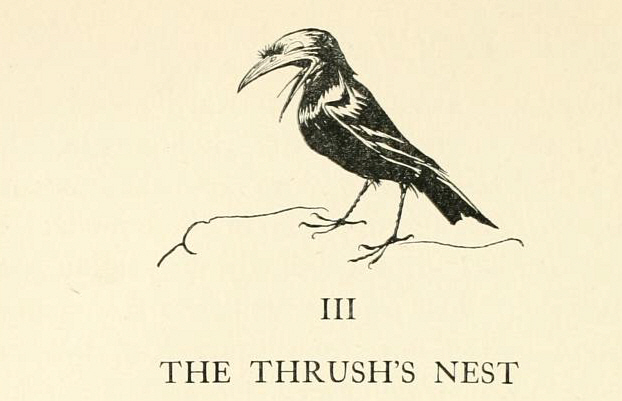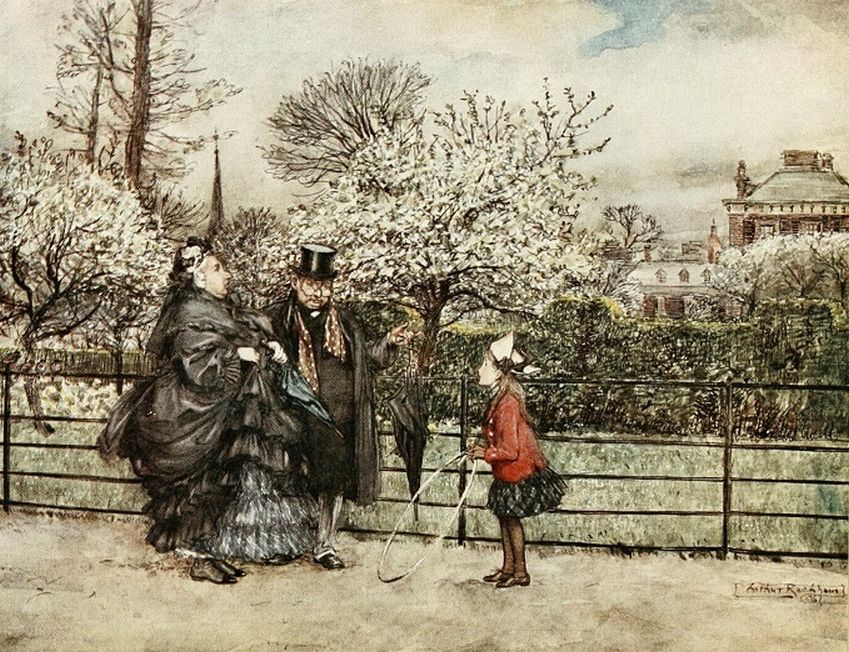It is a pitty that newer editions only show a part of the color plates and Rackham's black and white drawings disappeared, too.
THE GRAND TOUR OF THE GARDENS
I used to take David
there nearly every day unless he was looking decidedly flushed. No
child has ever been in the whole of the Gardens, because it is so soon
time to turn back. The reason it is soon time to turn back is that, if
you are as small as David, you sleep from twelve to one. If your
mother was not so sure that you sleep from twelve to one, you could
most likely see the whole of them.
The Gardens are bounded on one side by a never-ending line of
omnibuses, over which your nurse has such authority that if she holds
up her finger to any one of them it stops immediately. She then
crosses with you in safety to the other side.
The Kensington Gardens are in London, where the King lives.
The lady with the balloons, who sits just outside.
There are more gates to
the Gardens than one gate, but that is the one you go in at, and before
you go in you speak to the lady with the balloons, who sits just
outside. This is as near to being inside as she may venture, because,
if she were to let go her hold of the railings for one moment, the
balloons would lift her up, and she would be flown away.
In the Broad Walk you meet all the people who are worth knowing, and there is usually a grown-up with them to prevent them
going on the damp grass, and to make them stand disgraced at the corner
of a seat if they have been mad-dog or Mary-Annish. To be Mary-Annish
is to behave like a girl, whimpering because nurse won't carry you, or
simpering with your thumb in your mouth, and it is a hateful quality;
but to be mad-dog is to kick out at everything, and there is some
satisfaction in that.
Next we come to the Hump, which is the part of the Broad Walk where all
the big races are run...
It is glorious fun racing
down the Hump, but you can't do it on windy days because then you are
not there, but the fallen leaves do it instead of you. There is almost
nothing that has such a keen sense of fun as a fallen leaf.
They are great fighters, and thus so unlike country sheep that every year they give my St. Bernard dog, Porthos, a shock.
They are called
Paths that have Made Themselves, and David did wish he could see them
doing it. But, like all the most wonderful things that happen in the
Gardens, it is done, we concluded, at night after the gates are closed.
We have also decided that the paths make themselves because it is their
only chance of getting to the Round Pond.
They are great fighters, and thus so unlike country sheep that every year they give my St. Bernard dog, Porthos, a shock.
The Serpentine begins near here. It is a lovely lake, and there is a drowned forest at the bottom of it. If you peer over the edge you can see the trees all growing upside down, and they say that at night there are also drowned stars in it.
A small part only of the Serpentine is in the Gardens, for soon it passes beneath a bridge to far away where the island is on which all the birds are born that become baby boys and girls. No one who is human, except Peter Pan (and he is only half human), can land on the island, but you may write what you want (boy or girl, dark or fair) on a piece of paper, and then twist it into the shape of a boat and slip it into the water, and it reaches Peter Pan's island after dark.
He was a crab-apple of an old gentleman who wandered all day in the Gardens from seat to seat trying to fall in with somebody who was acquainted with the town of Salford, and when we had known him for a year or more we actually did meet another aged solitary who had once spent Saturday to Monday in Salford.
...and the moment he saw them he entirely forgot that he was now a little boy in a nightgown, and away he flew, right over the houses to the Gardens. It is wonderful that he could fly without wings, but the place itched tremendously, and—and—perhaps we could all fly if we were as dead-confident-sure of our capacity to do it as was bold Peter Pan that evening.

The fairies have their tiffs with the birds, but they usually give a civil answer to a civil question, and he was quite angry when these two ran away the moment they saw him.
Another was lolling on a garden chair, reading a postage-stamp which some human had let fall, and when he heard Peter's voice he popped in alarm behind a tulip.
To Peter's bewilderment he discovered that every fairy he met fled from him. A band of workmen, who were sawing down a toadstool, rushed away, leaving their tools behind them.
It was to the island that Peter now flew to put his strange case before old Solomon Caw, and he alighted on it with relief, much heartened to find himself at last at home, as the birds call the island. All of them were asleep, including the sentinels, except Solomon, who was wide awake on one side, and he listened quietly to Peter's adventures, and then told him their true meaning.
The birds on the island never got used to him. His oddities tickled them every day, as if they were quite new, though it was really the birds that were new.
Peter screamed out, 'Do it again!' and with great good-nature they did it several times, and always instead of thanking them he cried, 'Do it again!' which shows that even now he had not quite forgotten what it was to be a boy.
At last, with a grand design burning within his brave heart, he begged them to do it once more with him clinging to the tail, and now a hundred flew off with the string, and Peter clung to the tail, meaning to drop off when he was over the Gardens.
But the kite broke to pieces in the air, and he would have been drowned in the Serpentine had he not caught hold of two indignant swans and made them carry him to the island. After this the birds said that they would help him no more in his mad enterprise.
Shelley's boat, when opened, completely puzzled Solomon, and he took counsel of his assistants, who having walked over it twice, first with their toes pointed out, and then with their toes pointed in, decided that it came from some greedy person who wanted five. They thought this because there was a large five printed on it. 'Preposterous!' cried Solomon in a rage, and he presented it to Peter; anything useless which drifted upon the island was usually given to Peter as a plaything.
It was a stocking belonging to some bathing person which had been cast upon the island, and at the time I speak of it contained a hundred and eighty crumbs, thirty-four nuts, sixteen crusts, a pen-wiper, and a boot-lace. When his stocking was full, Solomon calculated that he would be able to retire on a competency. Peter now gave him a pound. He cut it off his bank-note with a sharp stick.
...and so, when you meet grown-up people in the Gardens who puff and blow as if they thought themselves bigger than they are,...
until he caught a favouring wind, which bore him westward, but at so great a speed that he was like to be broke against the bridge. Which, having avoided, he passed under the bridge and came, to his great rejoicing, within full sight of the delectable Gardens.
There now arose a mighty storm, accompanied by roaring of waters, such as he had never heard the like, and he was tossed this way and that, and his hands so numbed with the cold that he could not close them. Having escaped the danger of which, he was mercifully carried into a small bay, where his boat rode at peace.
You see, he had no one to tell him how children really play, for the fairies are all more or less in hiding until dusk, and so know nothing, and though the birds pretended that they could tell him a great deal, when the time for telling came, it was wonderful how little they really knew.

































Keine Kommentare:
Kommentar veröffentlichen